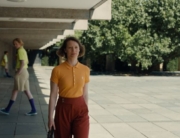
Early on in Holler, as brother and sister Blaze (Gus Halper) and Ruth (Jessica Barden) head to the local scrap metal yard to sell of some junk they’ve collected to help make their rent, the voice of Donald Trump is on the radio, intoning, “jobs, jobs, jobs, it’s a beautiful thing.” Both Blaze and Ruth work at a local factory, but that’s not enough to live on. Their mother is once again in jail for drug possession, so the two have to fend for themselves.
This is the Rust Belt America that Democrats neglected in 2016 and Trump capitalized on: the factory jobs that don’t pay nearly enough for a decent living, the opioid addiction ravaging the social fabric, and the hardscrabble hand-to-mouth existence that dooms bright, young kids like Ruth. The holler of the title might well be referencing writer-director Nicole Riegel’s scream of rage.
Sullen and angry, Ruth goes to high school by day and works with her older brother in the local packaging plant at night. She has no illusions or dreams. She hides the eviction notices that pepper the front door of her house under a plant so Blaze won’t see them. She steals books from the school library because she has been denied lending privileges—she has been late to school six times because of the factory job. What Holler is very good at is depicting the compromises, moral and otherwise, that those on the edge of or below the poverty line need to make to survive, as well as the indifference of others to those compromises: the self-made junkyard owner who illegally salvages scraps from abandoned buildings or Blaze, who minimizes any ambition to care for his sister. Then there’s the drug addict mother (Pamela Adlon), who was initially prescribed opioids for a job-related injury.
Unfortunately, Riegel piles so much injustice upon her characters that they buckle under the weight of it: Blaze and Ruth can’t pay their water bill, they get evicted, and the factory closes. This obscures the trenchant points Riegel is making. The junkyard owner, Hark (the scraggly, scruffy Austin Amelio), has managed to buy a house and is proud of the fact he didn’t go to college. He gets into an argument with Blaze regarding the need for a college education in front of the potentially college-bound Ruth, who surprisingly sides with Hark. Holler is too good and its characters too well drawn to fall into “poverty porn,” but it occasionally flirts very close to that line.
Luckily, the flaws in the script are compensated by Riegel’s considerable directorial skills. This well-paced film allows space for its characters to breathe, and the director coaxes marvelous performances out of everyone, particularly Barden, who is a talent to watch. Tromping around town with her ubiquitous red cap and blue earplugs, Ruth tries to drown out her town. She exemplifies the pride of a class that’s been beaten down again and again, and she pushes back whenever she can: against the teacher who tells her he can get her into an IT training school because college is out of reach for someone like her; and most of all, against the mother who could not get her addiction under control. It is a fierce performance.
Holler is a very good film, brimming with talent and a fierce indictment of the treatment and governmental neglect of the marginalized.






Leave A Comment